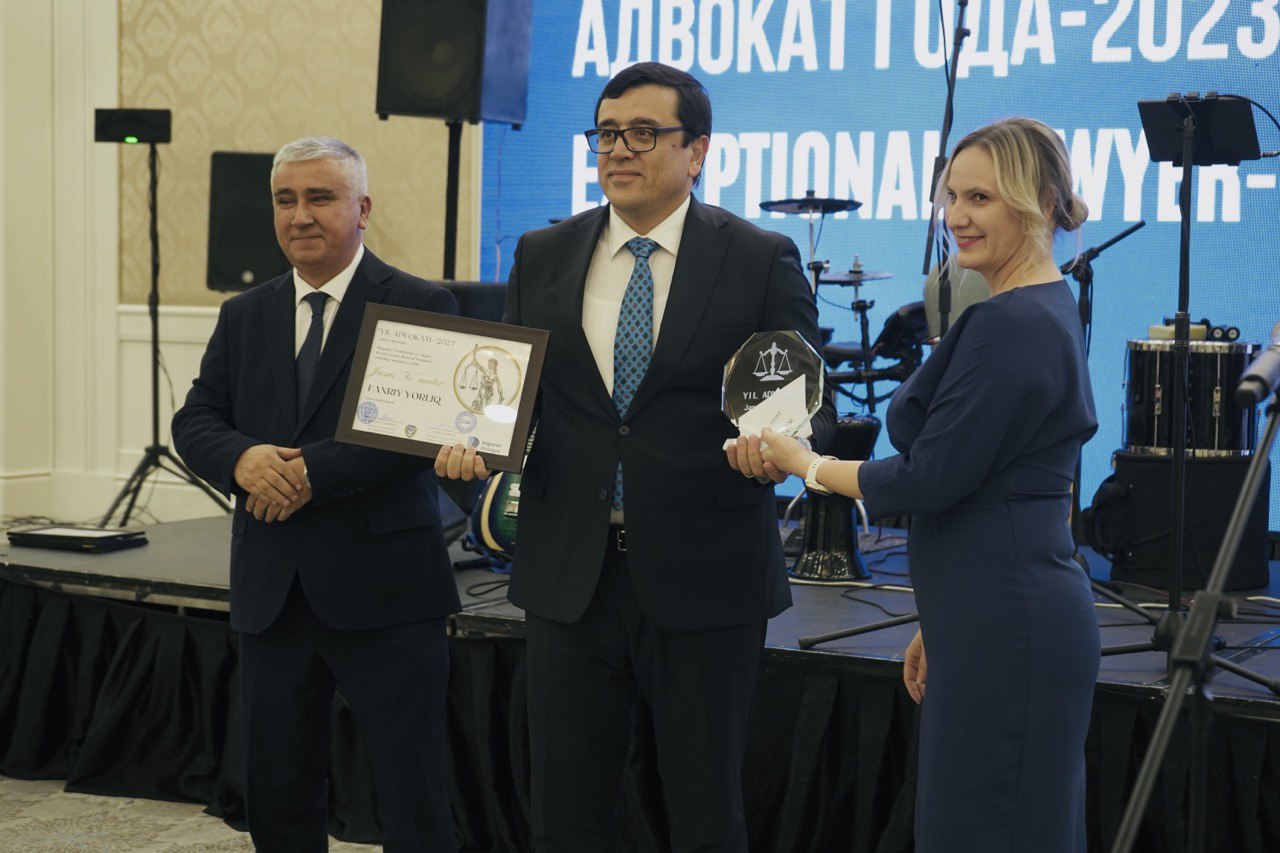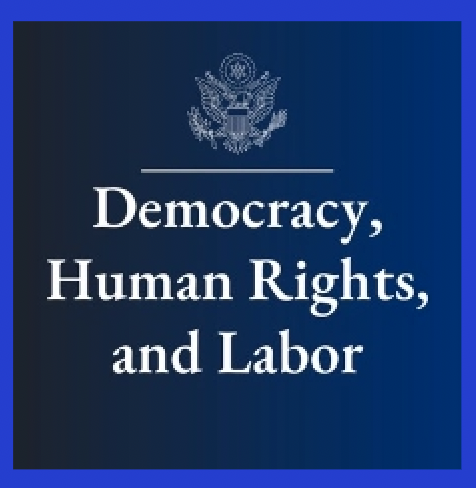Information about Richard Stoddard and why this award was named after him:
The organizers of the competition decided to name the award for exceptional contribution to legal reforms after Richard Stoddard for his enormous personal involvement in strengthening the rule of law and strengthening obligations to respect the rights and freedoms of citizens of Uzbekistan. Richard Stoddard's (1947 - 2022) professional passion was politics and its impact on people. Mr. Stoddard was committed to providing American assistance to the people of Uzbekistan to strengthen their independence and sovereignty and to support their efforts to build a prosperous democratic country under the rule of law. He made significant contributions to legal and judicial reforms and the protection of human rights during important stages of the transition period in Uzbekistan, which continues to this day.
After serving in Uzbekistan as a US AID representative, Mr. Stoddard served for many years as Senior Advisor for Central Asia in the Office of the Coordinator of US Assistance to Europe and Eurasia of the US Department of State, where he brought valuable perspective and unique contributions to the transition process. democracy in the Central Asian region, in particular in Uzbekistan. He paid particular attention to legal reforms, the protection of human rights and respect for the dignity of citizens, where lawyers, as the first and most important defenders of such rights, have an important role to play. He noted with satisfaction the strengthening role of the Chamber of Lawyers in the implementation of this mission.
With the Richard Stoddard Award for Exceptional Contribution to Legal Reforms, Mr. Stoddard's lifelong efforts and enormous contributions to the rule of law, political progress and secular democratic system, peace and respect for human rights and freedoms in Uzbekistan and Central Asia are forever etched in the history of Uzbekistan, Central Asian region and its people, to which Richard Stoddard devoted most of his professional life.

Zhasur Nematov has been practicing law since 2011. Doctor of Law, Professor of the Department of Court, Law Enforcement Agencies and Advocacy of the Tashkent State University of Law. He is a lecturer of academic disciplines as “Advocacy” and “Restorative Justice”, professional mediator, Chairman of the Higher Qualification Commission at the Chamber of Advocates of the Republic of Uzbekistan, and an expert on the Expert Council on Legal Disciplines under the Higher Attestation Commission of the Republic of Uzbekistan. He is also a member of the scientific advisory council on issues of criminal law at the Supreme Court of the Republic of Uzbekistan and a national consultant for UNDP, USAID, UNODC projects.
Why do you think you were chosen as the winner?
Any democratic secular state strives to carry out judicial and legal reforms solely for the purpose of guaranteeing respect for human rights. A lot of efforts are being made in this direction in our republic. To establish a truly independent judicial branch of government, scientific research is conducted and methodological developments are carried out, law enforcement practice is generalized, and ultimately national legislation is improved. Therefore, both national and international experts, scientists and practitioners in the field of law are involved jointly organizing the relevant work. I am also one of these specialists. I think that the organizers decided to award me the Richard Stoddard award given my specific contribution to the protection of human rights and freedoms.
Why did you decide to become a lawyer? What motivates you?
The main incentive to become a lawyer was the lawlessness that was committed against a person close to me. Over time, legality and justice nevertheless triumphed, and the violated rights of my client were completely restored. But I had to wait a very long time for this, make a lot of effort and feel the pain of irreparable losses. At the same time, it should be recognized that, at a certain moment in life, due to a number of reasons, whether subjective or objective, professionally you begin to realize that the work you are doing with special zeal no longer satisfies and pleases you. From this point of view, the profession of a lawyer is more free and creative, especially since the perception and feeling of the obvious assistance provided to the client in achieving a positive result in the case motivates you to engage in legal practice more and more.
What are you most proud of? Which of the cases you have carried out as part of your legal practice do you consider the most significant?
I am proud of the recognition of my clients and the fact that they rely on me as a specialist and turn to me to resolve issues that interest them. I didn't think about my biggest professional achievement or success. I believe that a lawyer’s professional achievements cannot be assessed by their significance because every issue settled within the legal framework is significant in its essence. If a client “checks out” the work of his lawyer, then believe me, a significant part of our society will already be aware of this lawyer.
How do you assess the development and state of the legal profession over the past few years?
In recent years, the legal profession has also undergone significant changes. And these changes, both legislatively and in the field of law enforcement, taking into account what we had before and now, should be perceived only positively by the legal community. But much remains to be done to improve the activities of the legal profession. It is impossible to solve all the problems of the legal profession that exist at once. I am sharing my thoughts, I hope my message will be received correctly by lawyers. The evolutionary process is always more effective than revolutionary transformations. History has proven this more than once. Today, every member of the legal community has the opportunity to openly express their opinion and position. If his proposal is convincing, well-reasoned and serves to benefit the development of the legal profession, I do not think that it will be rejected by anyone. This is a natural life process of development of a professional community. Therefore, I believe that the national legal profession is developing.
What are the main problems, in your opinion, facing the domestic legal profession today, and what are the ways to resolve them?
To begin with, I wanted to touch upon internal problems that hinder the development of the domestic legal profession. Not many lawyers pay attention to the sequence of presentation of the text of the lawyer’s oath given in the law, which begins with the words of the applicant joining the ranks of lawyers that he first swears to honestly and conscientiously fulfill his professional duty, then gives other assurances. In no way do I want to indicate by this that the professional duty of a lawyer is the highest value in comparison with his subsequent burden of protecting human rights and freedoms, maintaining attorney-client privilege, as well as complying with the Constitution and laws of the Republic of Uzbekistan. Absolutely not. But the very assignment of such qualities, initially, to the legal profession, it seems to me, is not without reason and is an opportunity provided to the legal profession by the legislator, through his example, to demonstrate to the public how to build an effective, efficient mechanism for interaction between both governing bodies and members of the community. This should be enshrined in corporate documents and serve as a standard for government agencies and other professional communities to follow. However, at present, many corporate acts of the legal profession leave much to be desired. In this regard, I believe that if the legal profession does not resolve its, at least, primary internal organizational problems, then talking about protecting the rights and professional activities of a lawyer from the outside makes no sense.
Separately, I would like to outline the pressing problems of carrying out legal activities in the field of specialization. There is still, to some extent, distrust and, in some situations, a biased attitude towards the legal community on the part of representatives of law enforcement agencies, courts and other departments. I will give a trivial example when a lawyer cannot immediately get an appointment with an official or wait for the start of any process, which sharply lowers the authority of the legal profession in the face of the public. This is also when a lawyer, without entering into the exercise of his professional rights to represent the interests of the client within the framework of the current legislation, faces such emotional barriers. Of course, one cannot fail to note cases of proper treatment of a lawyer, but they are rare. Not many people understand that the goal of all state and non-state entities is to serve the people. This is the policy of modern Uzbekistan. I believe that in the legal field, all participants should pursue a humane goal.
What is the most difficult part of your job?
The most difficult part of my work is when you become a witness to the fact that the competent authorities, when making relevant decisions, do not follow or their representatives take actions that are contrary to the requirements of applicable law. They do not understand that by doing so they not only discredit themselves, but also qualified workers and the authorities they represent. Even if, after a certain time, legality and justice ultimately prevail in the case, the feeling of mistrust towards government agencies persists for a long time, if not forever. I have been convinced of this more than once in my legal practice.
How do you think your work impacts society?
I believe that if I, as a lawyer, represent the interests of my clients and assist them in realizing their rights and freedoms or in restoring their violated rights and interests, then to some extent I influence the provision of legality in the activities of government bodies and the establishment of law and order in society, as well as increasing legal awareness and legal culture of the population.
What would you do to make the legal profession more attractive to young people?
I think this is a rhetorical question. If we think soberly, then from individual efforts, even with such an opportunity, I don’t think that the profession of a lawyer would become attractive to young people. Here, I believe, an integrated approach is needed; I stopped fragmentarily when I spoke about the problems of the legal profession. But, at the same time, I am convinced that the profession of a lawyer will be in demand and attractive to young people only if the rights of a lawyer and his professional activities are truly protected and guaranteed by the state through mandatory and correct compliance with the law by all authorized persons and bodies. Any appeals to authorities regarding violations of a lawyer’s rights and interference in his professional activities must be nipped in a timely manner and in the bud, and also receive a wide public response.
What advice could you give to our readers interested in becoming a lawyer?
No matter how hackneyed the advice for all professions may sound, which should be followed, since it has already been tested and does not require evidence, which is also characteristic and appropriate for the profession of a lawyer - this is constant study, research, work to improve one’s qualifications, without stopping there. This allows us to be unique, in demand and competitive in the legal services market. By gaining professional experience, you make yourself a respectable name as a lawyer.





